The Private Economy Promotion Law officially came into effect on May 20, 2025. As China's first foundational law named after the “private economy,” it clearly defines the strategic status of the private economy at the legal level for the first time and systematically addresses the core demands of private enterprises in areas such as fair competition, investment and financing, scientific and technological innovation, standardized operations, and rights protection. It elevates “tax compliance” to an unprecedented level and imposes systematic, mandatory, and accountable legal and tax risk prevention and control requirements on small and medium-sized enterprises. On July 20, 2025, the King&Capital Environmental Food and Drug Knowledge Research Center and Aishang Venture Finance Group jointly hosted a seminar on legal and tax risk prevention and control for small and medium-sized enterprises in the 22nd floor multi-function hall of the King&Capital Law Firm in Beijing. The symposium, themed “Legal and Tax Risk Prevention for Steady and Sustainable Development,” focused on nine key risk scenarios of greatest concern to SMEs: criminal, equity, contract, trade secrets, tax, bidding, financial compliance, labor and employment, and intellectual property. Numerous representatives from SMEs, tax and finance experts, and legal professionals attended the event to discuss strategies for the compliant development of SMEs.
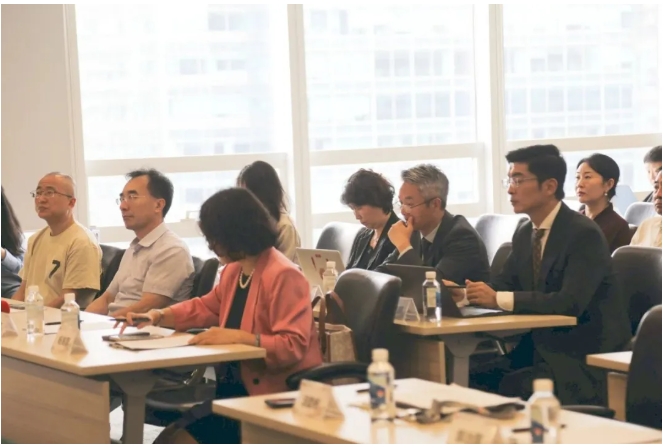
The seminar aimed to respond to the state's support and protection of private enterprises, highlight the coordination of legal and tax services, help small and medium-sized private enterprises prevent and control tax and legal risks encountered in the course of development, and safeguard the development of small and medium-sized enterprises. The seminar was hosted by Ms. Gao Yuman, a lawyer at Beijing King&Capital Law Firm.
Focusing on legal and tax coordination to safeguard the development of SMEs
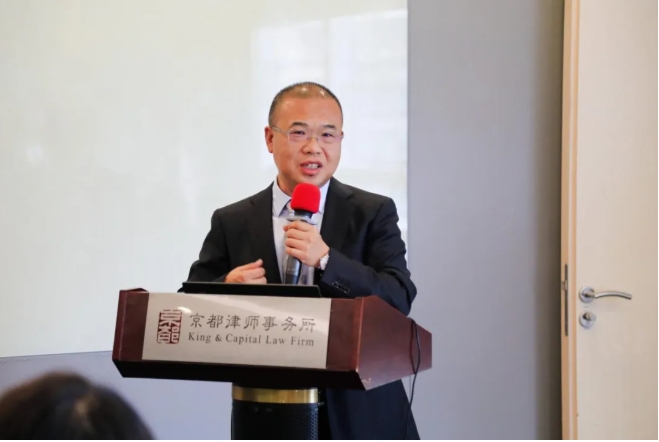
Mr. Tang Jianbin, Director of the King&Capital Environmental, Food, Drug and Intellectual Property Legal Research Center and Senior Partner at King&Capital Law Firm in Beijing, delivered the opening speech. Mr. Tang Jianbin first extended a warm welcome to all SME representatives, tax professionals, and fellow lawyers. At the opening ceremony, Director Tang Jianbin explained the purpose and original intention of establishing the King&Capital Environmental, Food and Drug Law Research Center platform in the context of the Private Economy Promotion Law, pointing out that the center will continue to integrate legal and tax resources to help SMEs and large state-owned enterprises achieve “equal rights and responsibilities, equal standards and policies.” Finally, Director Tang Jianbin expressed his gratitude to all the guests and wished the seminar a successful outcome.
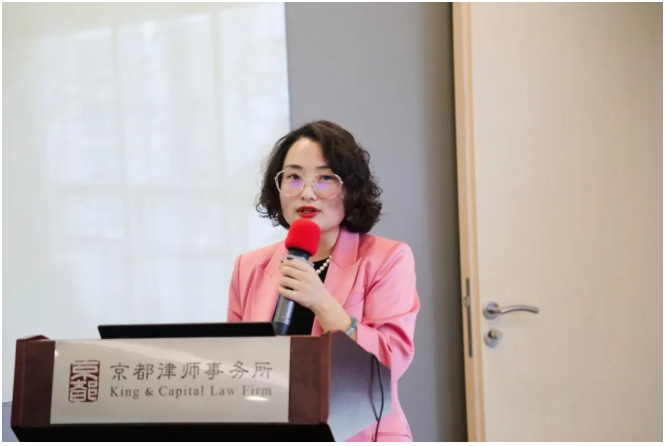
Yang Hairong, founder and CEO of Aishang Entrepreneurship Financial Group and integrated legal, financial, and tax strategy advisor, expressed gratitude to all friends who participated in or followed the event online and offline. She showcased Aishang Entrepreneurship Financial Group's practical experience and achievements in the field of legal, financial, tax, investment, and financing, highlighting the group's professional expertise in providing customized “legal risk management + financial management + tax planning” triple protection for enterprises. Finally, she invited tax professionals and elite lawyers from law firms to join the integrated legal, tax, and financial services initiative, with the aim of providing comprehensive support throughout the entire lifecycle of small and medium-sized enterprises using integrated legal, tax, and financial solutions in the future.
Strategic Partnership Signing and Expert Appointments, Building a Service Ecosystem Together
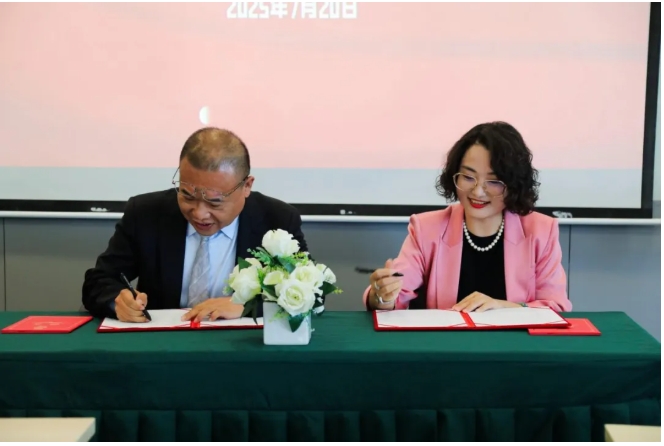
In order to deeply integrate the professional advantages of law and taxation, the King&Capital Environmental Food and Drug Knowledge Legal Research Center and Aishang Venture Finance Group signed a strategic cooperation agreement on site. At the same time, Aishang Venture Finance Group appointed Director Tang Jianbin of the King&Capital Environmental Food and Drug Knowledge Legal Research Center as the chief expert consultant of the Aishang Legal and Taxation Legal Service Team, and the King&Capital Environmental Food and Drug Knowledge Legal Research Center appointed Ms. Yang Hairong as the chief taxation consultant.
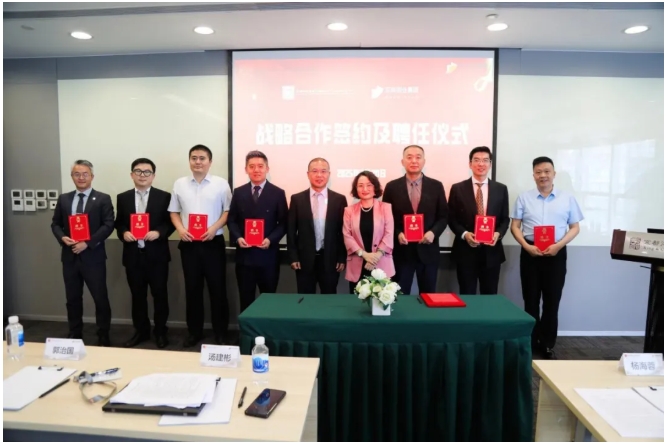
Aishang Entrepreneurship Financial Group also appointed the lecturing lawyers from this seminar as expert advisors to the Aishang Legal and Tax Services Team. Center Director Tang Jianbin and Aishang Founder and CEO Yang Hairong presented appointment certificates to lawyers Zhang Yongfu, Guo Xinpeng, Wang Zhiqiang, Guo Zhiguo, Lyu Yan, Yan Huainan, Wang Guannan, Feng Yunying, and Song Hong.
The participating expert lawyers shared nine major themes, directly addressing risk pain points.
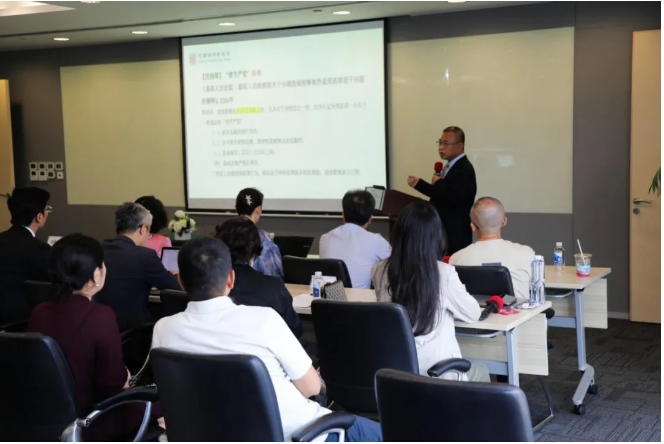
Tang Jianbin
Tang Jianbin, director of the King&Capital Environmental, Food and Drug Law Research Center and senior partner at Beijing King&Capital Law Firm, shared “Criminal Legal Risks and Responses for Tax and Financial Enterprises.” Drawing on the backdrop of the enactment of the “Promotion of the Private Economy Law,” Tang Jianbin used the framework of tax and financial enterprises' business and fund transfers as a foundation, and analyzed the legal provisions and criminal penalties for crimes such as issuing false invoices, issuing false value-added tax invoices, illegal business operations, fraud, and money laundering through actual case studies. Finally, Tang Jianbin recommended: When preventing and controlling legal risks, tax and finance enterprises should be wary of the risks of “shell companies” receiving and transferring funds, implement internal control systems, and avoid providing customers with services such as fund accounts, cash conversion, financial bills, securities, fund transfers, and fund transfers when the legality of the source of funds cannot be verified.
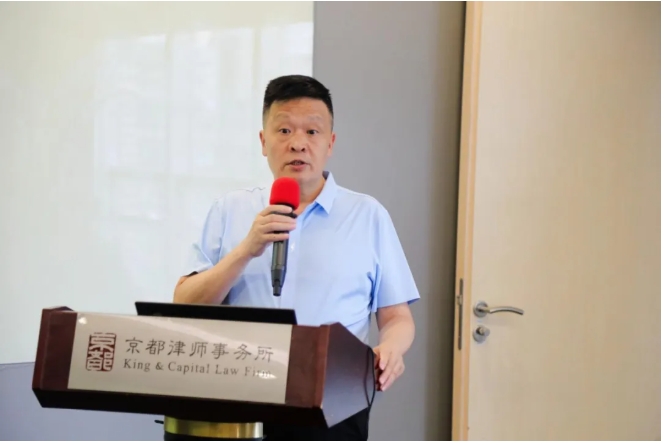
Zhang Yongfu
Zhang Yongfu, deputy director of the King&Capital Environmental, Food, and Drug Law Research Center and senior partner at King&Capital Law Firm in Beijing, shared his insights on “Legal Risk Prevention in Corporate Equity Design.” Zhang Yongfu addressed six key areas: equity ratio design, shareholder agreements and articles of association, capital contributions and equity holding arrangements, equity incentives and tax considerations, special equity changes, and foreign and state-owned equity matters. Zhang Yongfu emphasized that corporate founders should exercise caution in handling financing and equity distribution, be vigilant against equity dilution, and prevent the loss of company control. Finally, Zhang Yongfu summarized the five key steps for compliant equity design: clarify business objectives, formulate shareholder agreements and articles of association, ensure compliance with capital contributions and structure, establish a dynamic adjustment mechanism, and conduct professional reviews.
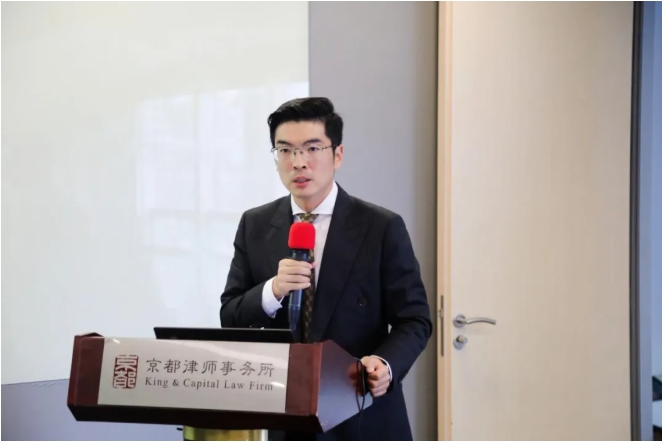
Guo Xinpeng
Guo Xinpeng, a lawyer at King&Capital Law Firm in Beijing, shared his insights on “Legal Risks and Responses in Corporate Commercial Contracts.” Guo Xinpeng interpreted the invalidity of contracts caused by false collusion, legal risks and responses in the contract performance process, and the dilemma of contract termination based on practical cases. Guo Xinpeng noted that fraudulent collusion primarily manifests in two forms: “multiple contracts” and “discrepancy between name and substance.” Entrepreneurs should avoid engaging in any form of financing-related trade when signing contracts. Finally, Guo emphasized that while the law stipulates four statutory grounds for termination, it also grants both parties the right to agree on termination. Entrepreneurs should make full use of their termination rights to minimize transaction losses when contract performance becomes impossible.
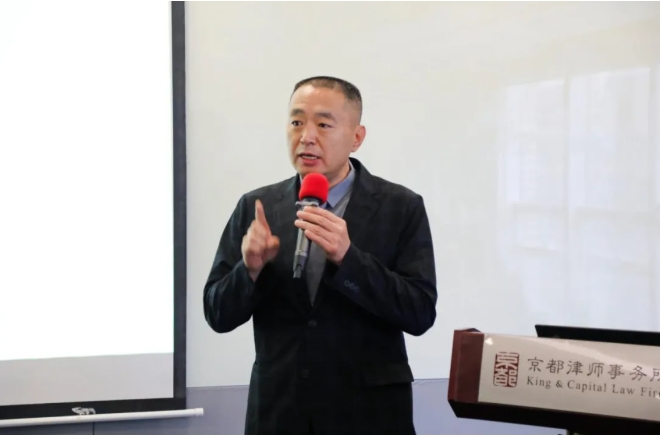
Wang Zhiqiang
Wang Zhiqiang, deputy director of the King&Capital Food and Drug Law Research Center and lawyer at King&Capital Law Firm in Beijing, shared his insights on “Protecting the Trade Secrets of Small and Medium-sized Enterprises.” Lawyer Wang Zhiqiang advocated that enterprises should make good use of Article 219 of the Criminal Law on the crime of infringing trade secrets to protect their legitimate rights and interests. The crime of infringing trade secrets focuses on protecting the technical solutions, business information, and customer groups of enterprises, which can bring prestige and benefits to enterprises and make their development more long-lasting and stable. Acts of commercial secret infringement generally fall into three categories: theft-type, transplantation-type, and breach-of-contract-type. Wang Zhiqiang believes that when a company sues another party for commercial secret infringement, it must focus on three key stages: appraisal, evidence collection, and loss assessment. Among these, the appraisal stage must address three aspects: confidentiality appraisal, identity appraisal, and value appraisal. When a company faces charges of commercial secret infringement, challenging these three aspects of the appraisal stage is also a crucial defense strategy.
Immersive experience, visiting the King&Capital Law Firm
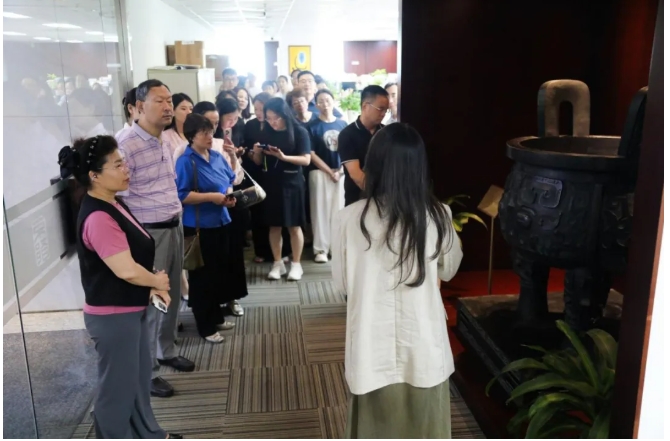
During the intermission, the guests visited the King&Capital Law Firm under the guidance of Center Director Tang Jianbin and lawyer Gao Yuman of the King&Capital Law Firm. Through legal cultural symbols such as “Xiezhi” and “Goddess of Justice,” they experienced the professional heritage accumulated by the law firm over 30 years, and the atmosphere of the exchange was lively.
Experts and lawyers continued to discuss corporate risk prevention issues
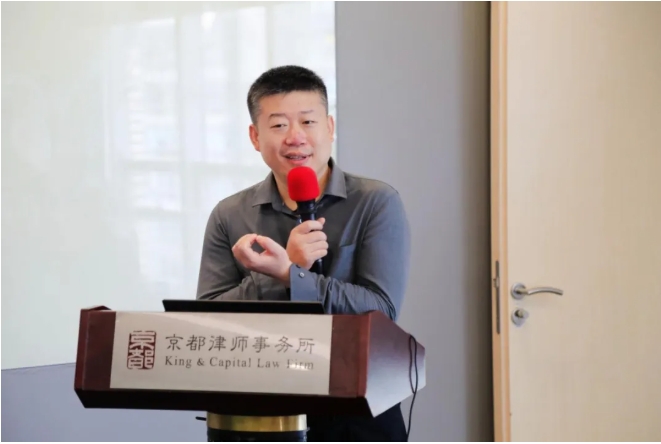
Guo Zhiguo
Guo Zhiguo, a partner at Beijing Dachen (Xicheng District) Law Firm, shared insights on “Corporate Tax Penalty Risks and Responses.” Guo Zhiguo addressed two aspects: common tax violations and common tax penalties and responses: Failing to report all bank accounts to the tax authorities, failing to properly retain ledgers and vouchers, failing to file tax returns as required, failing to obtain invoices as required, using other vouchers in place of invoices, and failing to submit accounting software to the tax authorities—these five behaviors are considered to have relatively minor social harm and are primarily subject to administrative penalties; Underpaying taxes, tax evasion, concealing assets, intentionally destroying accounting vouchers, accounting books, financial accounting reports, issuing fraudulent invoices, using fraudulent VAT special invoices, defrauding export tax rebates, and smuggling are considered to have greater social harm and carry the risk of criminal penalties. Finally, Attorney Guo Zhiguo emphasized that honest business operations, compliance with tax laws, and enhancing the professional competence of accounting and tax personnel are the optimal solutions for addressing common tax penalties.
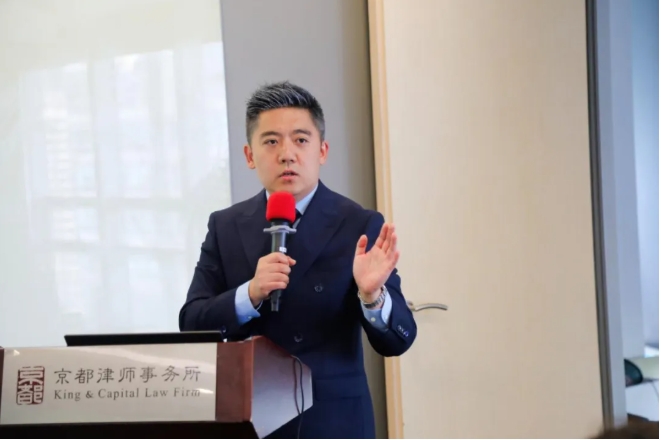
Lü Yan
Lü Yan, deputy director of the King&Capital Food and Drug Law Research Center and partner at King&Capital Law Firm in Beijing, shared his insights on “Legal Risks and Responses in Corporate Bidding.” Lü Yan analyzed the state's trend in punishing collusive bidding through specific legal provisions and typical cases, and detailed the administrative consequences and criminal penalties for collusive bidding. Finally, Lu Yan recommended that construction companies improve compliance in the bidding field by enhancing the legal knowledge of practitioners, strengthening corporate management, standardizing bidding behavior in accordance with the law, and forming professional legal teams.
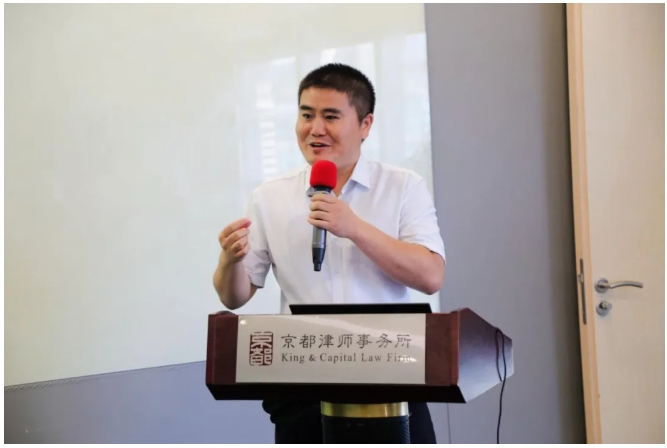
Yan Huainan
Yan Huainan, deputy director of the King&Capital Environmental, Food and Drug Law Research Center and senior partner at Beijing King&Capital Law Firm, shared his insights on “Criminal Red Lines for Shareholders' Private Use of Company Funds and Property.” Attorney Yan Huainan introduced the case of Zhang Fa Cai's embezzlement of funds to explain the distinction between the crime of embezzlement and the crime of misappropriation of corporate assets, providing suggestions for business operators on how to safely allocate and use corporate funds. First, business operators should standardize corporate fund usage, distinguish between personal and corporate assets, and improve financial systems; second, business operators should establish a corporate governance mindset, adhere to internal decision-making mechanisms, and establish fund allocation procedures; Finally, business operators should reasonably distribute salaries and dividend payments to fundamentally resolve the greed and desires of enterprise employees.
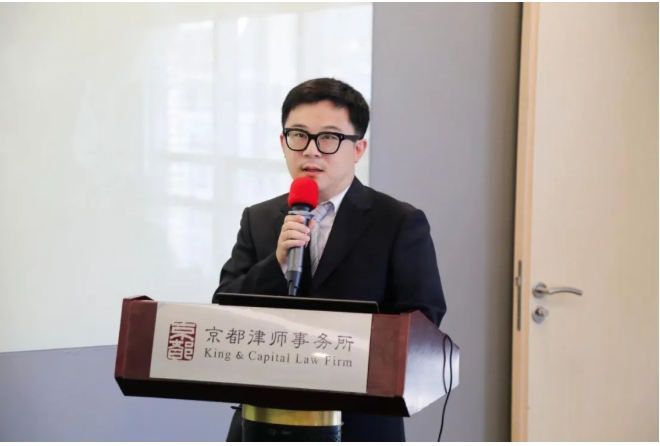
Wang Guannan
Lawyer Wang Guannan from King&Capital Law Firm in Beijing shared “Legal Risks and Responses in Labor Employment.” First, lawyer Wang Guannan pointed out that labor dispute cases are currently on the rise, and mediation and arbitration institutions are actively accepting such cases. Second, Wang Guannan analyzed the causes of such cases from four aspects: economic environmental factors, non-standardized employment practices by companies, new employment models in emerging industries, and workers' awareness of their rights. Subsequently, Wang Guannan shared five case studies to address specific issues, such as whether injured workers can claim an extension of the period of suspension of work and wages based on a medical diagnosis certificate, and whether employers can transfer or reduce the salary of female employees due to pregnancy. Finally, Mr. Wang recommended that enterprises standardize employment management, strengthen corporate culture construction, enhance legal awareness, and establish labor dispute prevention mechanisms to respond to the challenges of new employment models.
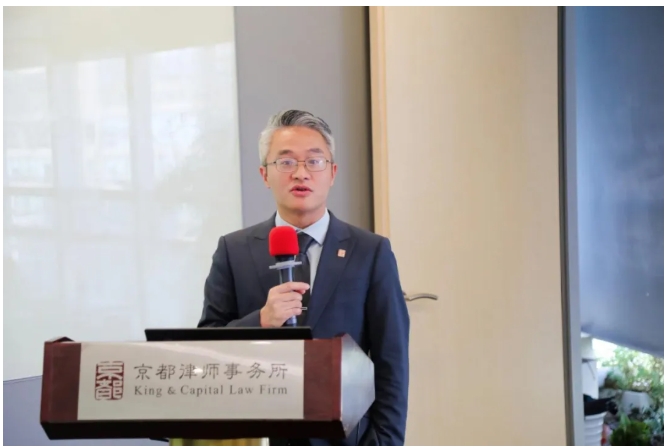
Feng Yun
Feng Yun, a lawyer at King&Capital Law Firm in Beijing, shared his insights on “Legal Risks and Responses to Intellectual Property Rights in Companies.” Attorney Feng provided an in-depth explanation of the criminal offenses of counterfeiting registered trademarks, selling counterfeit registered trademark goods, and illegally manufacturing and selling counterfeit registered trademark labels, including the criteria for criminal liability and the main changes in the 2025 judicial interpretation. She also discussed the challenges and difficulties faced in criminal protection of copyright, such as unclear departmental responsibilities, insufficient evidence of infringement, difficulties in proving infringement, and high thresholds for criminal liability. Finally, Attorney Feng mentioned the issue of handling intellectual property rights involved in criminal cases, which requires lawyers with specialized intellectual property legal knowledge to assist in distinguishing between them to protect the legitimate property rights of the parties involved.
Closing Remarks: Co-Creating a Blueprint for Collaborative Development
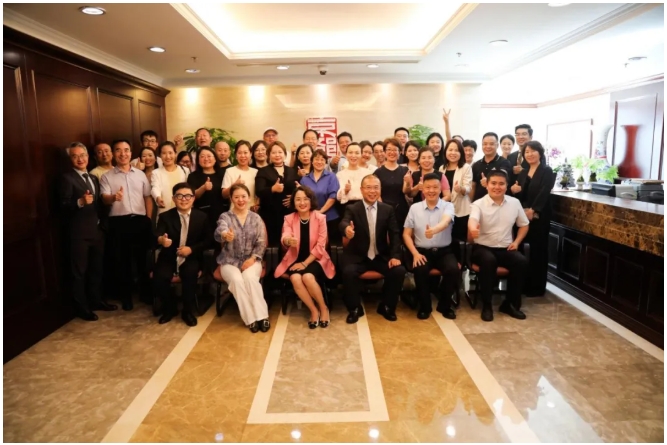
Finally, Yang Hairong, Founder and CEO of Aishang Entrepreneurship Financial Group, delivered the closing remarks. This seminar established a “practical” dialogue platform for the legal and tax industries, and will continue to provide integrated legal, tax, and financial solutions to help small and medium-sized enterprises “lighten their load and run faster,” ensuring steady and sustainable development. The successful holding of this seminar provides important references for deepening collaborative cooperation between legal and tax sectors, as well as for small and medium-sized private enterprises to mitigate tax and legal risks during their development process.





